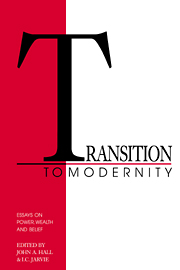Book contents
- Frontmatter
- Contents
- List of illustrations
- List of contributors
- Introduction
- PART I THE PRE-MODERN WORLD
- PART II TRANSITIONS TO THE MODERN WORLD
- 4 On a little known chapter of Mediterranean history
- 5 Ernest Gellner and the escape to modernity
- 6 The emergence of modern European nationalism
- 7 Sovereign individuals
- PART III MODERNITY AND ITS DISCONTENTS
- Indexes
7 - Sovereign individuals
Published online by Cambridge University Press: 02 February 2010
- Frontmatter
- Contents
- List of illustrations
- List of contributors
- Introduction
- PART I THE PRE-MODERN WORLD
- PART II TRANSITIONS TO THE MODERN WORLD
- 4 On a little known chapter of Mediterranean history
- 5 Ernest Gellner and the escape to modernity
- 6 The emergence of modern European nationalism
- 7 Sovereign individuals
- PART III MODERNITY AND ITS DISCONTENTS
- Indexes
Summary
Many years ago I showed Ernest Gellner a review I had written of a Barrington Moore book. It began with some remark about most of us from time to time harbouring the ambition to spend a few years licking history into shape. I remember his comment: you've hit on my secret weakness! We should be grateful that he finally indulged this weakness – and glad that Plough, Sword and Book had been gestating over such a long period of time in such a lively iconoclastic mind inhabiting such a diversity of worlds: anthropological, philosophical, sociological; metropolitan, Oxbridgean, Muslim, Eastern and Central European. Where the intellectual historian will eventually place the book in the Gellner oeuvre it is hard to predict; its ambitious scope and its comprehensiveness make it less easily summarisable as message than his Thought and Change of twenty years earlier, though the style has anything but mellowed; the sharpness of the epigrams and the imaginative leaps of the analogies, the punning on proverbs, the playful reifications of abstracts are as beguiling as ever.
And in the end, he is too much social scientist to turn prophet and offer us a real philosophy of history, complete with a guide to what the meaning of it all is, and an indication of where we are going. As schematisation and explication of the past it is a tour de force; his trinity of cognition, coercion and production proves so much more useful an instrument than a simple base/superstructure dichotomy.
- Type
- Chapter
- Information
- Transition to ModernityEssays on Power, Wealth and Belief, pp. 167 - 184Publisher: Cambridge University PressPrint publication year: 1992
- 1
- Cited by



